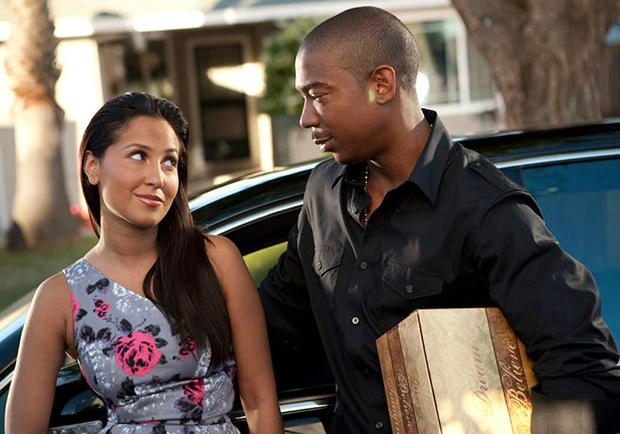The bad-boy drug-trafficker; the devout girl of faith. The church, the club, the interrogation room. Throw in Stephen Baldwin as a detective and (not one but) two appearances from Christian rappers, and we at least have all the right ingredients for a promising movie.
But when you actually put it together and project it on the screen, the film gets in the way of the story it was trying to share.
I can't possibly begin to tackle here why it seems so hard to make a great Christian film. But one thing I've noticed consistently is that the message seems to get in its own way. If you try too hard to convey the message(s), you risk pummeling the relatable part of your art out of the production. The audience will hear a lot, but just not "feel it." And in this vein, Church Girl tries to pack too many messages (about conversion, about faith, about drugs, about romance, about tragedy, about church, and more) into a movie that just isn't wide enough to hold it all.
 Marcus Ingram / Getty Images
Marcus Ingram / Getty ImagesFormer drug trafficker Miles Montego (the rapper Jeffrey "Ja Rule" Atkins) falls for "Church Girl" Vanessa (Adrienne Bailon, formerly of The Cheetah Girls). But he needs to navigate a faith culture foreign to him, while simultaneously trying to leave behind his hoodlum-y past.
By the time we meet her, it's clear that the church girl is in love with church. She works in a store for "faith-based products" (I spotted a lot of NOTW—Not Of This World—merch), and has a mom who won't shake Miles's hand until she knows what church he goes to. In every scene Vanessa references her church and her Bible study, and reminds her man, "don't forget to say your prayers."
So it's a little strange when we realize that someone whose vocabulary is so full of church terms only asks him much later if he's been thinking about answering those "altar calls." This missionary dating scenario continues until the near-end of the film, and it feels just a little off—especially since Vanessa talks more about "church" than God. (The movie's title is fitting, and revealing.)
Montego has a whole lot of struggles. He can't seem to abandon the "club scene" and the friends who reminisce about his good old drug peddling days. He's confused why a good God allows pain and suffering. He doesn't understand abstinence till marriage—yet he somehow manages to abide by it until we forget it's a struggle. And of course, he doesn't think church is cool (although he starts to, when he meets a pastor with a fast car and music tastes akin to his own).
None of these issues are singled out for deep examination, but they are all remedied at the same moment of the climax in which Montego falls on his knees (alone in church, in front of a stain-glass depiction of Jesus) and cries surrender. Until this point, it's hard to tell which thread of potential material the plot will fully flesh out, and it doesn't help that two federal officers are following Montego this whole time, hinting that they have spiritual struggles of their own.
Ja Rule is actually good in this movie: his prayers come across as sincere as can be, with acting that is similarly believable. The story is his, not the Church Girl's, and it was probably a good idea to put the weight of the material squarely on his shoulders. The difficulty is only that the movie asks him to juggle too many problems to tell an effective story in the film's 118 minutes—and continuity suffers.
By the time Montego hits his knees, we know that the previous climatic bit of drama has finally put him there. But we're left wondering whether it really takes that level of intensity to move a searcher or a stagnant believer to the same place.
I guess the obvious answer is that the journey of faith looks different for everyone, and the point of this film is that extreme measures are required for extreme cases of knee-bending. If you're a drug-trafficking rogue who's in love with a feisty faith-girl, just gone through a traumatic loss, facing criminal charges, and in the hospital praying by a bedside, then Montego's conversion won't just be a climax, but a heartfelt relief. But given how over the top the story is for what it's trying to do, the average moviegoer—or churchgoer—may be left too busy trying to keep up to really get the point.
Caveat Spectator
The film is rated PG for thematic elements, a scene of violence, some suggestive content, and brief language. The characters talk a little about sex, and some scenes at the club show people drinking alcohol.
Taylor Lindsay is a fall intern with Christianity Today Movies and a student at The King's College in New York City.










